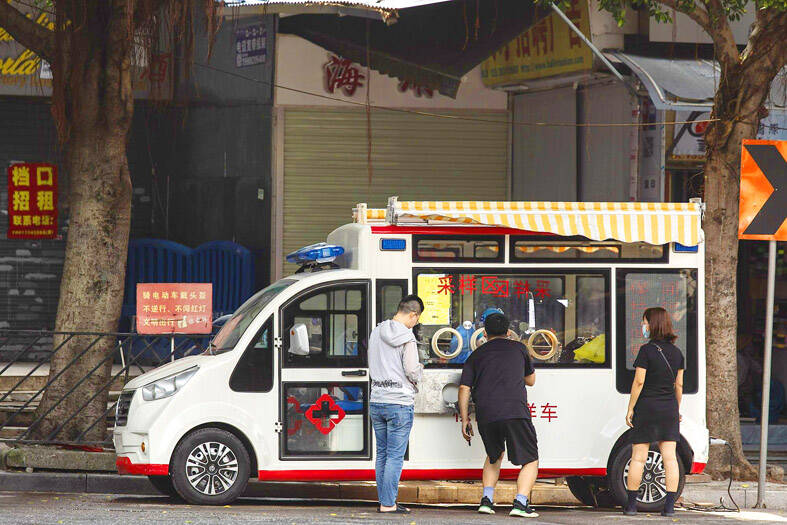New COVID-19 cases surged in Guangzhou and other Chinese cities, official data showed yesterday, with the global manufacturing hub becoming China’s latest COVID-19 epicenter and testing the city’s ability to avoid a Shanghai-style lockdown.
Nationwide, new locally transmitted infections rose to 7,475 on Monday, China’s health authority said, up from 5,496 the day before and the highest since May 1. Guangzhou accounted for nearly one-third of the new infections.
The increase was modest by global standards, but significant for China, where outbreaks are to be quickly tackled when they surface under its “zero COVID” policy. Economically vital cities, including Beijing, are demanding more polymerase chain reaction (PCR) tests for residents and locking down neighborhoods and even districts in some cases.

Photo: Bloomberg
The sharp rebound will test China’s ability to keep its virus measures surgical and targeted, and could dampen investors’ hopes that its economy could ease curbs and restrictions soon.
“We are seeing a game between rising voices for loosening controls and rapid spreading of COVID cases,” said Nie Wen, a Shanghai-based economist at Hwabao Trust.
Considering how the nationwide COVID-19 curbs are crushing domestic consumption, Nie said he had downgraded his fourth-quarter economic growth forecast to about 3.5 percent from 4 to 4.5 percent. The economy grew 3.9 percent in July-September.
The rising caseload dragged on China’s stock markets yesterday, but shares have not yet surrendered last week’s big gains.
Investors see China’s beaten-down markets as an attractive prospect as a global slowdown looms, and have focused on small clues of gradual change — such as more targeted lockdowns and progress on vaccination rates.
“No matter how harsh the letter of the law is ... there is a little bit more loosening,” said Damien Boey, chief macro strategist at Australian investment bank Barrenjoey.
Guangzhou, capital of Guangdong province, reported 2,377 new local cases for yesterday, up from 1,971 the previous day. It was a dramatic jump from double-digit increases two weeks ago.
Surging case numbers in the sprawling city, dubbed the “factory floor of the world,” means Guangzhou has surpassed the Inner Mongolia city of Hohhot to become China’s COVID-19 epicenter, in its most serious outbreak ever.
Many of Guangzhou’s districts, including Haizhu, have imposed varying levels of curbs and lockdowns, but it has not imposed a blanket lockdown like the one in Shanghai earlier this year.
Shanghai, currently not facing a virus resurgence, went into a lockdown in April and May after reporting several thousand new infections daily in the last week of March.
“We have been working from home for the past couple of days,” said Aaron Xu, who runs a company in Guangzhou. “Only a few compounds have been locked up so far. Mostly we are seeing disruptions in the form of public transit services being suspended and compound security barring couriers and food delivery. And we have to do PCR tests every day.”

Indonesia was to sign an agreement to repatriate two British nationals, including a grandmother languishing on death row for drug-related crimes, an Indonesian government source said yesterday. “The practical arrangement will be signed today. The transfer will be done immediately after the technical side of the transfer is agreed,” the source said, identifying Lindsay Sandiford and 35-year-old Shahab Shahabadi as the people being transferred. Sandiford, a grandmother, was sentenced to death on the island of Bali in 2013 after she was convicted of trafficking drugs. Customs officers found cocaine worth an estimated US$2.14 million hidden in a false bottom in Sandiford’s suitcase when

CAUSE UNKNOWN: Weather and runway conditions were suitable for flight operations at the time of the accident, and no distress signal was sent, authorities said A cargo aircraft skidded off the runway into the sea at Hong Kong International Airport early yesterday, killing two ground crew in a patrol car, in one of the worst accidents in the airport’s 27-year history. The incident occurred at about 3:50am, when the plane is suspected to have lost control upon landing, veering off the runway and crashing through a fence, the Airport Authority Hong Kong said. The jet hit a security patrol car on the perimeter road outside the runway zone, which then fell into the water, it said in a statement. The four crew members on the plane, which

Japan’s ruling Liberal Democratic Party (LDP) and its junior partner yesterday signed a coalition deal, paving the way for Sanae Takaichi to become the nation’s first female prime minister. The 11th-hour agreement with the Japan Innovation Party (JIP) came just a day before the lower house was due to vote on Takaichi’s appointment as the fifth prime minister in as many years. If she wins, she will take office the same day. “I’m very much looking forward to working with you on efforts to make Japan’s economy stronger, and to reshape Japan as a country that can be responsible for future generations,”

SEVEN-MINUTE HEIST: The masked thieves stole nine pieces of 19th-century jewelry, including a crown, which they dropped and damaged as they made their escape The hunt was on yesterday for the band of thieves who stole eight priceless royal pieces of jewelry from the Louvre Museum in the heart of Paris in broad daylight. Officials said a team of 60 investigators was working on the theory that the raid was planned and executed by an organized crime group. The heist reignited a row over a lack of security in France’s museums, with French Minister of Justice yesterday admitting to security flaws in protecting the Louvre. “What is certain is that we have failed, since people were able to park a furniture hoist in the middle of